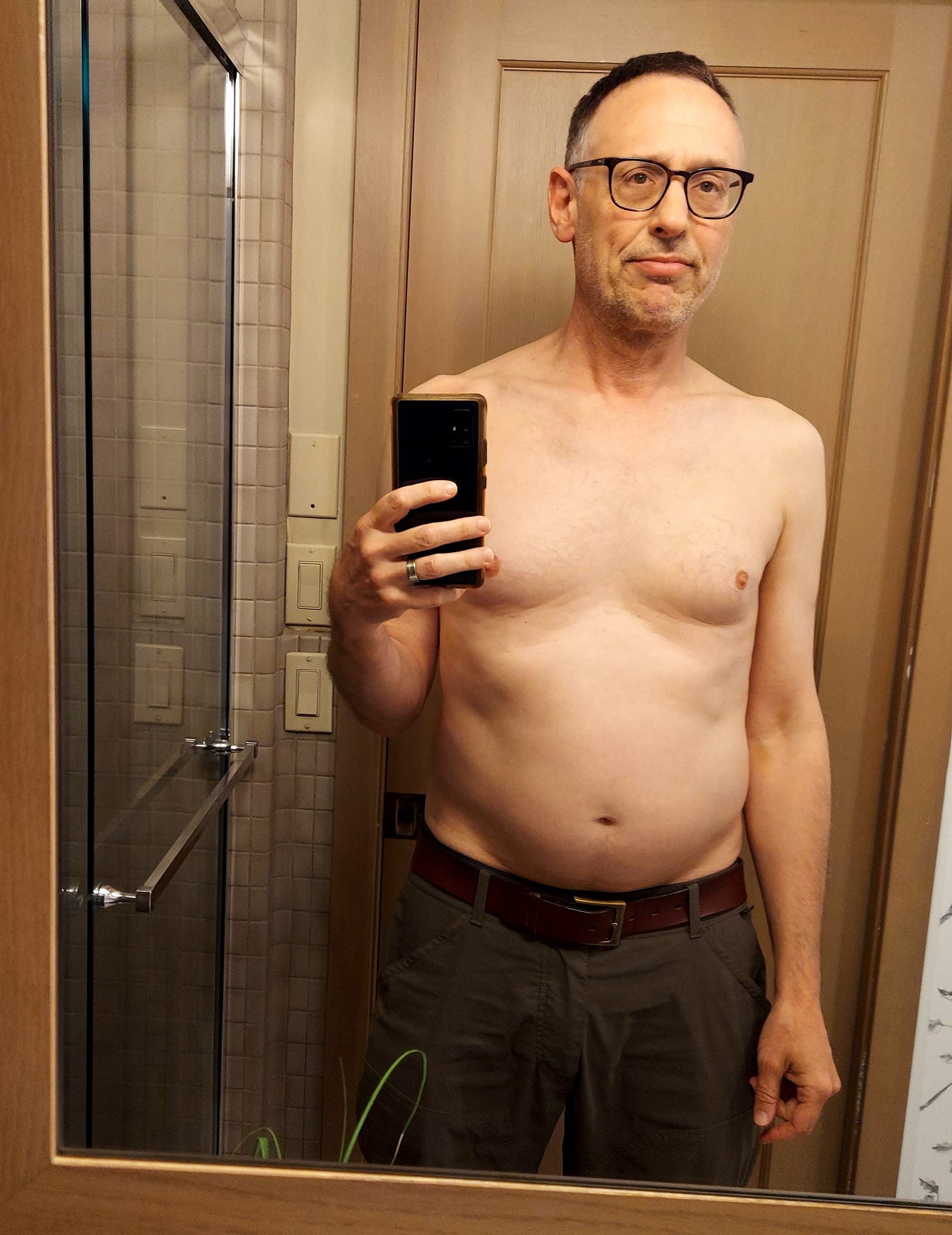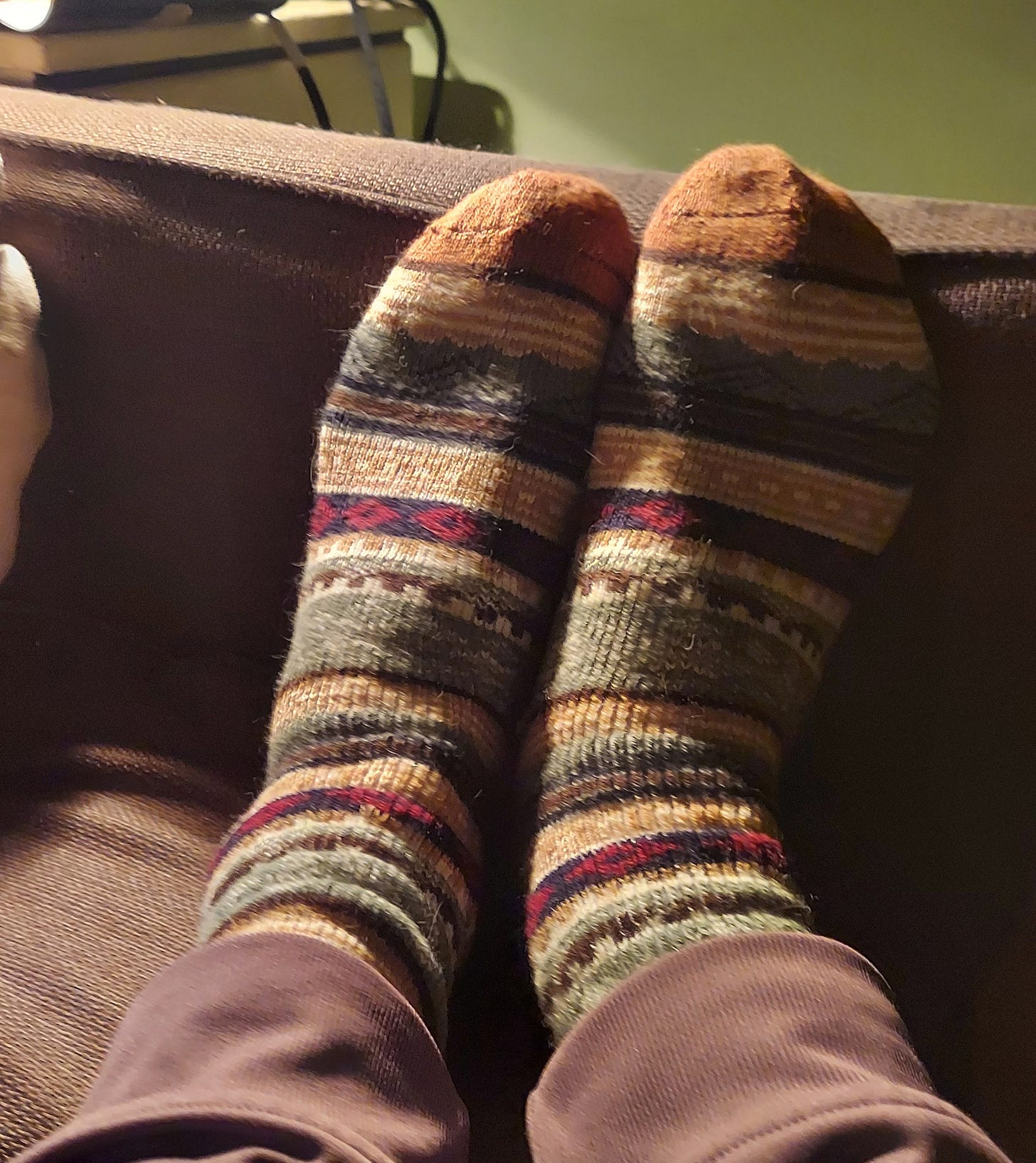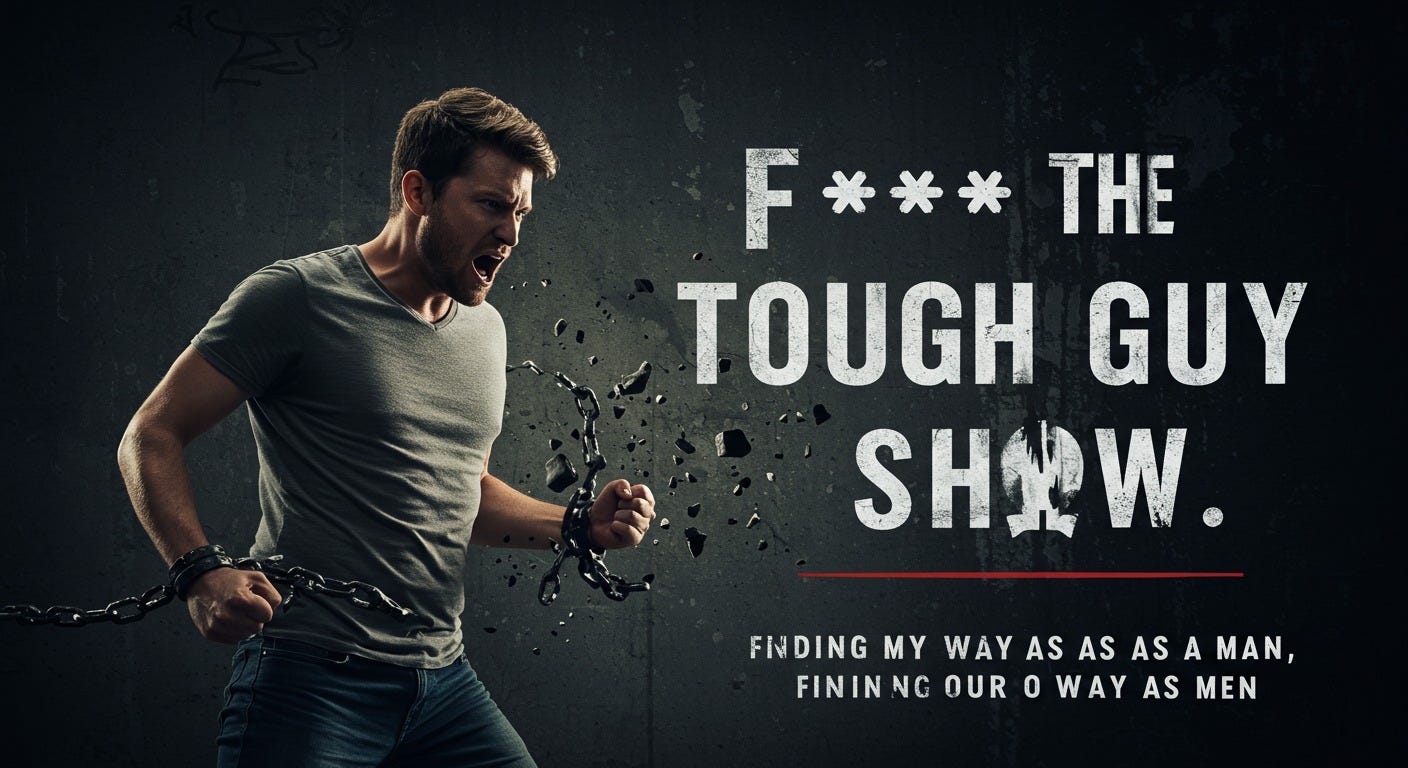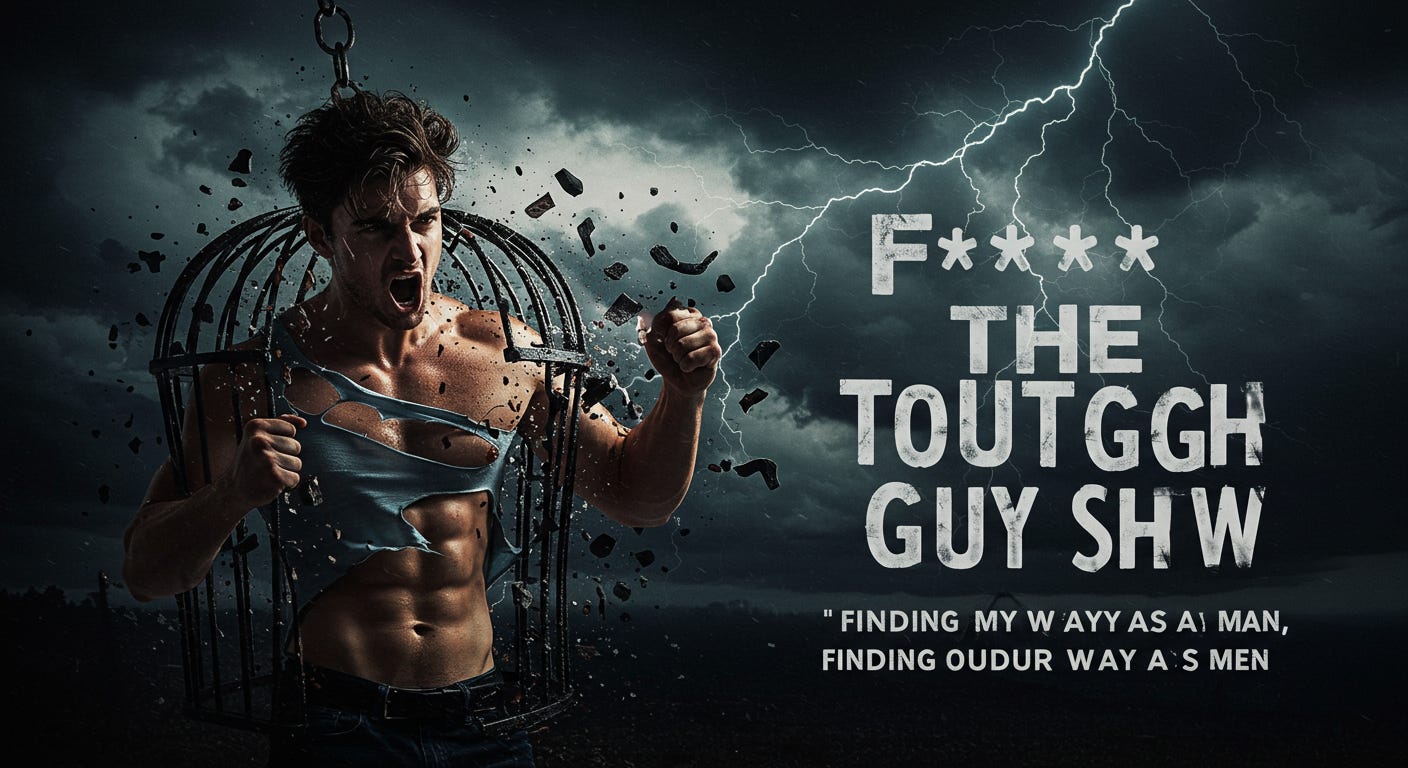I forgave myself for my girth this week.
Gave myself grace for a belly that’s much bigger than it was 5 years ago.
Came, actually, to imagine giving my gut a kind of cozy, supportive hug.
I say why in the first item of this edition of FrauenTimes. It’s a reflection on my body image and our need to integrate the muscularity of the divine masculine and the receptivity of the divine feminine—especially in hard times like these.
The second item has something to do with bellies too. It’s about your feedback on my draft book covers—including the one with the guy with abs of steel!
The final item is a video that also gets at the issue of men softening at times to meet this moment. It’s on 3 ways men can become vulnerable and curious.
Enjoy!
***
Loving My Love Handles
I’m trying to turn shame into something more like understanding and even gratitude
I figured I would be digging into childhood memories when I signed up for a few “somatic therapy” sessions recently.
I was hoping to tease out the “issues” that might be in my tissues going back decades. I figured the combination of moving my body and talking out fears might help me more deeply heal the anxiety that has plagued me periodically since I was a kid.
All this happened. But not in the order I expected.
What I did first in my last session was admit that I felt shitty about my stomach. Today. About the tummy you see in the selfies here. Not exactly the fit, sexy, sixpack selfies you often find people posting on Instagram.
And that has bothered me as a man over the past several years.
Beginning about 7 or 8 years ago, I started putting on extra pounds. I’d been a slim, fit guy for five decades. And then I started getting a little fat. I stopped playing basketball weekly. My metabolism slowed. Even with weekly yoga classes and occasional laps in the pool, my belly started to bulge.
Then came the pandemic. And I was a perfect case of the “Covid 19.” I literally put on 19 pounds during the lockdown years.
And I’ve had a hard time shaving them off since. The love handles have made me self-conscious and less confident. Have made me love myself less.
I didn’t fully realize this shame until I worked with my somatic therapist Livanna last week. She had me sense where I felt tension in my body, and where I felt comfort. I told her I felt pain in my lower back, while my feet felt great.
As we continued our conversation about what I sensed in my body, I was suddenly aware of my midsection. And perhaps because of the safety I felt with Livanna, I told her I felt ashamed of it. Sad and humiliated to have a much bigger belly than I used to.
Around this point in the therapy session, I lay down on my stomach. And the sadness and shame I felt in this moment transported me to my boyhood. I remembered a similar emotion around my body as an adolescent and young adult.
***
Yes, I had been fit most of my life. But I also was skinny. And I felt stuck in that less-than-manly frame. While friends began lifting weights in junior high and high school, I begged off. I didn’t believe I could meaningfully strengthen my body, and took solace instead in the strength of my mind. I felt self-esteem from doing well in school.
It’s strange to say, but there was something satisfying–healing even–about lying there on a yoga studio floor and feeling low. It was as if I finally gave myself permission to feel ALL the feels of being scrawny back in my youth and tubby today in my late fifties.
With my guard let down, I started being kinder to myself. I’m not sure I sloughed off all the years’ worth of mild self-loathing. But I was able to feel for that 12-year-old me. After all, I’d been socialized in an era of “fixed mindsets.” Unlike the “growth mindset” embraced today in schools and many families, I grew up believing that people are largely unchangeable. Choosing to concentrate my ego on academic achievements made sense as a strategy, however unconscious.
The self-compassion extended to the present as well. I began to see my belly in a different light. It’s been a challenging 7 years or so for me—especially the past five. I know I’ve had it far easier than 95 percent of people on the planet. But relatively speaking, things got difficult. There were the meanspirited, lawless years of Trump’s first presidency. Then the deadly pandemic. The challenges of raising two teens. I also started my own business, had a stress-related heart attack, and ensuing anxiety attacks. And now the second Trump presidency and the rise of the “manosphere,” both of which can feel like a personal failure given my advocacy of a healthier, kinder masculinity.
Maybe a soft belly is what I’ve needed during these hard times. Part of what’s expanded my midsection are some eating habits that are about comfort. I know I’ve engaged in “emotional eating”—wolfing down chips when I’m nervous. I also do what weightloss and wellness app Noom calls “fun eating”--enjoying foods like spaghetti Bolognese for pure pleasure.
If I have taken extra bites during bleak, scary years to feel a bit better, maybe that’s ok.
This grace I’m giving myself is having a surprising impact. I feel more ready and committed to reduce my weight. To bring my belly back. Or rather bring it forward to a healthier, stronger place.
Maybe I have completed the “stress cycle” around my body image distress. Maybe this is a case of connect-then-correct. Beating myself up in recent years about my gut hasn’t led me to lose weight. But forgiving myself for adding pounds seems the catalyst I needed to begin shedding them.
***
Some caveats are in order. I imagine other people wrestle with weight and body image issues in ways that are much more traumatic than what I’ve experienced. Women, especially, have had years of body image pressures. And plenty of fat-shaming. I don’t mean to trivialize any of that in sharing my story.
But I think it’s important to acknowledge that men can feel bad about their bodies too. In fact, there’s evidence of growing pressure on boys and young men to conform to a near-impossible ideal of “swole.” The six-pack, bulging biceps look. In the manosphere, the message is often that one must be able to demonstrate great physical strength to be manly.
The tricky thing about the pressure to be muscular is that it’s not entirely wrong. A fit, powerful body can be healthy and reflects the divine masculine—strength, drive, the ability to protect and provide for others. But the muscle-man goal can quickly go to an extreme, unhealthy place.
Trying to be a “hard-body,” to have “abs of steel” can lead us to lose sight of another half of our humanity: the divine feminine. Vulnerability, gentleness, compassion, connection. Surrender, even. Yin softness to go with yang assertiveness.
For us men, it can be difficult to integrate the masculine with the feminine. Especially us men raised in an America that has lionized the cowboy, the self-made man. A country where Donald Trump’s father told him to be a “killer,” a “king.” And that’s what he has largely gone about doing.
***
I’m called to contest that imbalanced, immature, domination-based masculinity. And I’m feeling more ready to do so than just a few weeks ago. I’m feeling ready to take better care of my body and mind to prepare it for whatever rigors are ahead.
I credit this confidence in part to pulling off a version of that masculine-feminine integration in my recent therapy session.
When Livanna asked me where in my body I felt good, I said “my feet” largely because of the socks I was wearing. They are striped, wool socks given to me this Christmas by dear friends Jason and Colette. These pals told me they hoped the socks would help me feel “hygge.” Hygge is a Norwegian word meaning warmth and coziness. My friends knew I’ve been a big fan of this term in my work. Hygge speaks to the divine feminine. It’s something that men in Northern Europe seem particularly able to embody. It can be sexy even, as seen in a Ted Lasso episode.
I wasn’t feeling sexy about my belly during the therapy session. But I did begin to feel warm and kind toward it. Livanna had me imagine bringing the hygge of my feet to my belly. I envisioned my socked-feet tapping on my tummy. Spreading compassion and affection across my abdomen.
It worked. The shame began to dissolve. In its place rose a kind of appreciation. A recognition why my belly had grown over the past several years. And a measure of thanks to my softer core for how it helped me to move through complex, scary times.
I hope to reduce my love handles in the months and years to come.
For now, though, I’m loving them.
Don’t Judge a Book by its Draft Covers
Thanks for responding to my book cover survey, plus Rowena’s warm-and-fuzzy option
Each edition of FrauenTimes I plan to include something from my upcoming book, tentatively titled F*ck the Tough Guy Show: Finding My Way as a Man. Finding Our Way as Men.
The essay above on body shame and acceptance may find its way into the book. (I’d welcome your thoughts on whether you think that piece is book-worthy!)
This item of FrauenTimes also is about the book. I want to thank everyone who shared feedback on the different cover design options I shared last month.
As a reminder, here were the options I generated through AI and asked about:
The winner in terms of feedback? There wasn’t a clear one!
I figured nobody would like the last one, with the ripped fella breaking out of a cage. So “extra,” no?!
But that’s exactly what one respondent appreciated about it—the shock value.
Another bit of feedback I got was to diversify the imagery. Offer something other than the prototypical, fit white guy.
No one seemed to like option 2—the image with the thoughtful fella gazing across the horizon.
Maybe I shouldn’t say no one liked that image. My wife, Rowena Richie, wanted something even more dramatic when it comes to showing the softer side of men.
Here are the images she generated using AI:
Her phrase used to produce these images: “Men looking lovingly into each others’ eyes holding soft furry animals.”
It’s interesting that even with her explicit direction, AI didn’t give any images with men actually looking into each others’ eyes. Is male intimacy so hard to imagine that it just doesn’t compute?
Drop a comment if you think there’s something about going in Rowena’s super-soft , anti-tough-guy direction for the book cover.
All input considered!
And stay tuned for more on the book.
How Men Can Soften Up
A video on 3 ways men can become vulnerable and curious.
Part of how I’m getting through the body shame I’ve been feeling is letting my guard down and asking questions.
I admitted to myself and my somatic therapist that I felt bad about my bigger belly. And I wondered why I may have developed overeating habits in recent years. Vulnerability and curiosity are often hard for men. We’ve been told to be invincible and to know all the answers. “I don’t need to ask for directions!” :) To ask a question is itself a kind of vulnerability. But in the world that’s emerging, we need to put down our armor and ramp up our curiousity. Here are some thoughts about how to do that.
CLICK HERE FOR THE VIDEO (3 min. 43 sec.)
Each edition of FrauenTimes includes a video with advice designed to support men at work—as part of workplaces that work for all.
Today’s video comes from AthenaOnline, a great resource for elevating leadership skills and improving workplace culture. Note that this video link becomes obsolete after 14 days (April 24, 2025). After that, you’ll need an AthenaOnline subscription to access it.
Thanks for reading FrauenTimes! See you again soon!













